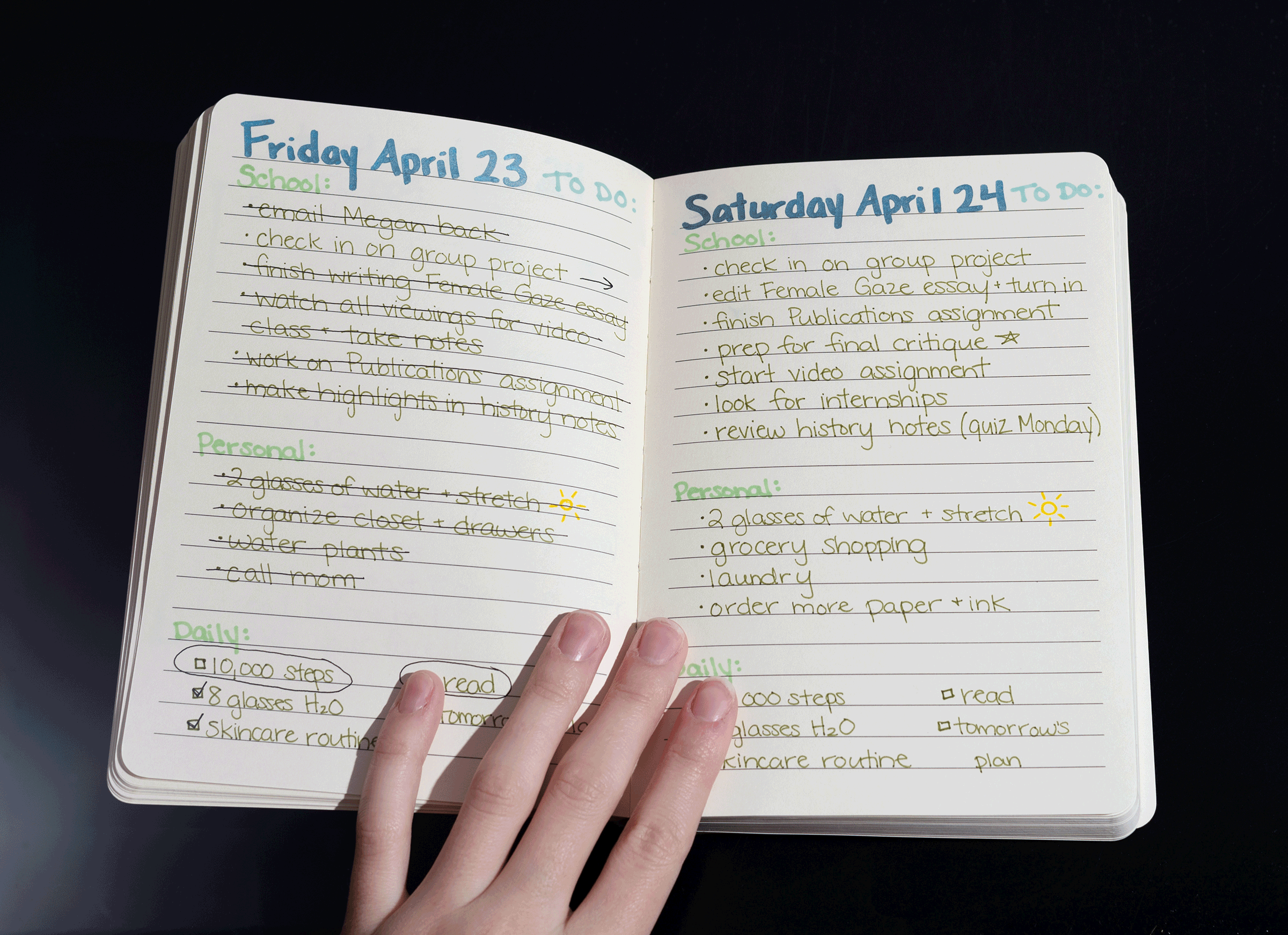The Toxic Culture of Scheduling
Since I was roughly 7 years old, I have been an avid collector of empty diaries and journals. The first few days of having them, I would recount my day (consumed probably with going to school, watching T.V. and having dinner), and then I’d schedule the next day’s antics. Several days after––a week max––they’d be abandoned, and it would seem that the idea of scheduling would be impossible. At a young age, I was beating myself up for not completing the small goals I would set for myself. It could be as little as tidying my room, doing a piece of homework, or watering plants. Part of me wonders if I actually wanted to achieve these things, or if I was just trying to fill the page. Was it more satisfying to plan the taks, or to fulfill them?
In the current social climate, Gen-Z has a particular pressure to be successful. Nowadays, it seems that everyone is trying to climb a never-ending ladder to reach the top. With our overexposure to social media and the ever decreasing age of influencers, content creators, and creatives, there seems to be more pressure to ‘grind’ and succeed. If you go on the explore page, you’ll probably come across motivation and bullet journal accounts that glorify planning, organisation, and accordance. We consume a bunch of quotes telling us not to quit, but to rest. Do we actually take it in? We never actually let ourselves rest, ever, even if the quote is saved as our lock screen and desktop background. These empty quotes, plus our driving passion for comparison, make a recipe for disaster. Why do we let this happen to ourselves? Is organisation and bullet-journaling culture toxic?
Well, social media is completely subjective. We can’t gate-keep everything, and we can’t always avoid consuming content that doesn’t suit us. For some, listing (and especially aestheticising it) is extremely helpful because it puts plans and thoughts in one tidy and pretty place, and it’s also a way to demonstrate our creativity. We invest in bullet journaling paraphernalia; our desks are filled with washi tape and pastel highlighters. Some of us will put 30 minutes in, some of us dedicate two hours.
Often on social media, though, everything isn’t always what it seems. When I began to convert my calligraphy Instagram into a bullet journal account, I noticed immediately the twofold traction I was receiving from the new photos. People loved the content and I loved creating it, but when it came to writing down a to-do list to fill the white spaces on my dotted Leuchtturm1917, I noticed I was giving myself an unachievable amount to do. “Am I a fraud?” I thought. There was no way I could have achieved all the things I’d been putting on my list, and that’s when it sunk in.
I began to tell myself that there was no reasonable explanation for not completing all of the tasks, because there were so many examples of others who could manage it. I mean, who’s to say if they were or weren’t? We know the farce that social media is. Regardless, I would effectively bully myself into thinking that there was not actually any time for rest; that I won’t get anywhere if I’m not putting in the time and effort to achieve things, even if there aren’t enough hours in the day for them. That’s where a vicious cycle begins.
Greek philosopher Epictetus suggested an idea along the lines of, “We cannot choose our external circumstances, but we can always choose how we respond to them.” Through these practices, we’ve established methods to handle pressures and expectations––such as the rise in aesthetic bullet journaling and our need for compartmentalisation––but, we create a toxic environment for ourselves when the realities of this don’t manifest. We are our own biggest enemies in this situation, as we only fuel self-doubt and paranoia.
I wish I could say that there was a solution to this, but everyone’s experiences are completely subjective. If you’re someone like me, who beats themselves up for not completing the tasks we set for ourselves, I want to remind you that you are not superhuman. Sure, people may seem like they’re doing better, but that will always be the case. We forget to be selfish sometimes, and to take care of ourselves. First, we need to not overestimate ourselves. Then, we need to stop torturing ourselves when we don’t fulfil our goals. It’s not about being irresponsible, it’s about being cautious of ourselves, alongside our goals. To-do lists and schedules help, but they are by no means set in stone.

